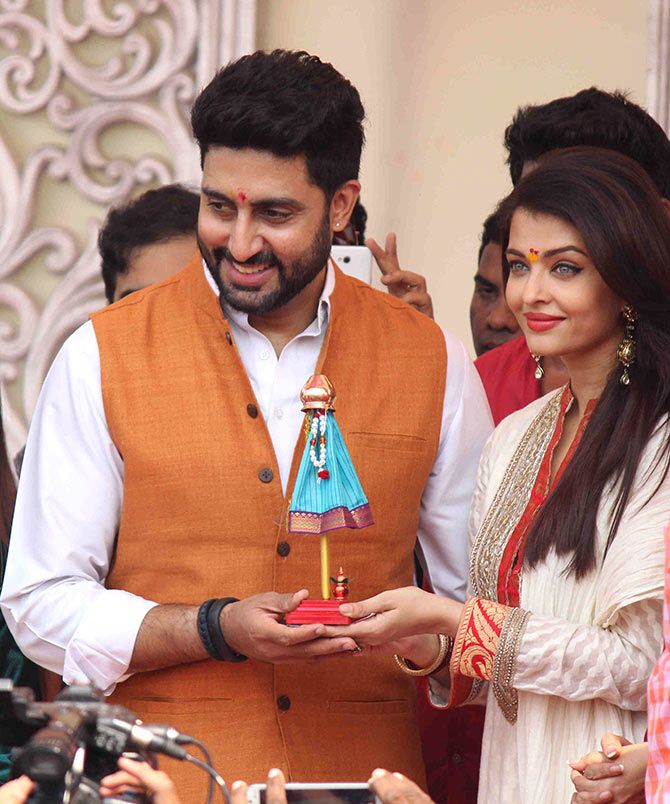
Ash and Abhi help the TTK Group strengthen its mass appeal, reports Apurva Venkat.
For three generations, the TTK Group has held sway over South India; its popular Prestige brand of pressure cookers being the most identifiable symbol of the company's dominion.
Prestige cookers have also led the group's sporadic national forays, advertisements with the tag line Jo biwi se karein pyaar, Prestige se kaise karein inkaar? (If you love your wife, how can you refuse her a Prestige?) bringing instant recall among a large segment of consumers.
Over the past four years, the group has hardened its resolve about taking the regional star status away from its star brand.
To make Prestige a national label, TTK invested in a pan-Indian distribution network and built a pipeline of new products to cater to the changing needs and design sensibilities of the modern kitchen.
But most importantly, it focused on creating a national identity for Prestige.
TTK brought star couple Abhishek Bachchan and Aishwarya Rai Bachchan on board and over the past four odd years has leveraged their mass appeal to make the brand a familiar name in markets both different and distant from its traditional strongholds in the South.
Today, the company says, Prestige is an instant recall for consumers across the country and it is not just pressure cookers that people are talking about.
"When we started with Abhishek and Aishwarya, we were not number one in the North, East and West zones. We were number one only in the South. The appeal of the two is more in these regions, though she is a South Indian girl. Four years into the campaign, we are number one in all four zones. Brand recall in any study, we are right on top," said T T Jagannathan, chairman, TTK Prestige.
One of the first things the group did was to identify and leverage the strength of its mother brand, Prestige.
"People (companies) have segmented markets with different brands. We used only one brand across price points," said Chandru Kalro, managing director, TTK Prestige.
"While that helped the company consolidate its branding efforts, the challenge was to ensure that the brand straddled both budget and premium segments with equal ease. There was a need to premiere the brand, a need to go national with width and depth," Kalro said.
In stepped the Bachchan couple as endorsers. It was decided to keep the old tag line in the ads as that was still coming up high on people's recall lists, but set it in a new context.
"We needed a real life couple, both working, both known to bring in that emotional c connect. That was how the Abhishek-Aishwarya story happened," said Jagannathan.
The storyboard was amended.
In the previous ads, the husband was responsible for bringing a Prestige home.
But women today make their own purchases and men cook and help in the kitchen too; the ads were imbued with the new sensibilities of a young consumer group.
Harish Bijoor, chief executive officer, Harish Bijoor Consults, believes the success of the Prestige brand has come on account of the robust range of products it offers.
Endorsements by Aishwarya and Abhishek have helped too by drawing in a completely new set of consumers.
"The advertisement launched the brand in a different market that has people who follow Bollywood," said Bijoor.
Research has played a big role in the transformation of the brand, not just in shaping its communication strategies, but also the product line.
The company says it conducts at least 15 to 20 studies on consumer lifestyles, new pain points, aspirations, and demographic changes every year.
This is then used to shape strategy.
"That has been the basis of all product development," added Kalro.
As a result the company says it has found success with its innovations and new launches.
TTK Prestige comes out with 100 new products each year and 85 per cent of their sales revenue today is from products launched during the last five years, a period during which the company has also doubled its revenue.
Kalro says they look at popular problem or concern areas and adapt their product line accordingly.
Healthcare, time-saving, convenience and the changing aesthetic values of a younger generation -- these are the major concerns of today and the product line reflects that.
The company too is bowing to change.
In April it said it would expand into the cleaning solutions business, offering solutions such as an electric mop, designed specifically for Indian conditions.
"We will be walking out of the kitchen and entering new segments like cleaning solutions," said Jagannathan.
"However, the company is clear that it will stick with its target audience, the woman of the house.
For instance, Kalro said the new range of cleaning products are also targeted at them because 'While men may cook, men do not clean.'
Catering to the Indian homemaker means that the company has to be abreast of the latest developments in design too.
"I go to the R&D centre at least twice a week," Jagannathan says. "We have people from outside doing the aesthetics for us."
"We are very good at engineering, but aesthetics we do not do."
As the Indian market transforms itself and societal structures realign themselves, the southern conglomerate is learning to keep in step with the times.










